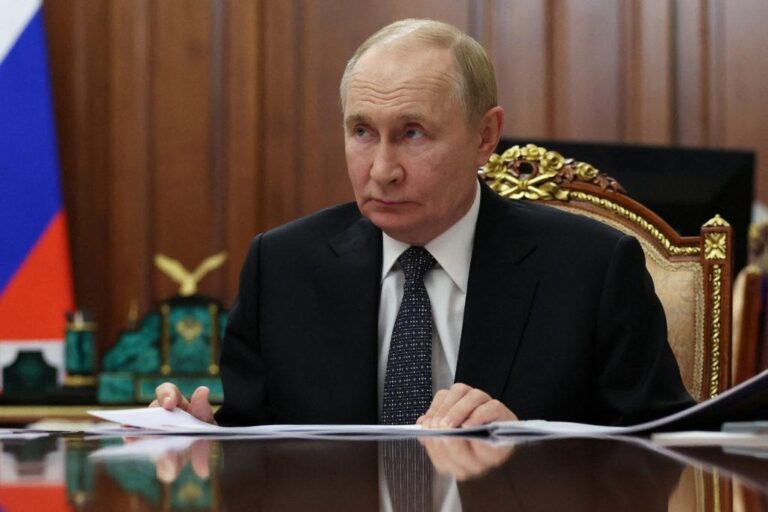In a recent development escalating tensions in the ongoing conflict, Russia has publicly accused Ukraine and Western nations of hypocrisy regarding the recent strikes on Kyiv. Moscow claims that the Western condemnation of these attacks contradicts their own military actions and support for Kyiv, deepening the divide between the opposing sides. This accusation underscores the persistent discord surrounding the war in Ukraine, as each party continues to exchange allegations amid mounting international concern.
Russia Claims Western Double Standards Amid Kyiv Attack Coverage
Russia has sharply criticized Western media and governments for what it calls a “hypocritical” double standard in their reporting and reaction to recent missile strikes in Kyiv. Moscow alleges that while Western outlets rapidly condemn actions attributed to Russian forces, similar acts by Kyiv or its allies either receive minimal attention or are justified under different pretenses. Russian officials have highlighted discrepancies in coverage, claiming that Western narratives consistently frame Kyiv as a victim without scrutinizing the Ukrainian military’s role in escalating conflict zones near civilian areas.
In a detailed statement, the Russian foreign ministry outlined several points supporting their argument:
- Selective outrage: Western countries condemn Russian strikes but downplay Ukrainian military operations affecting civilian populations.
- Media imbalance: Prominent outlets allegedly ignore or soften reports on Western-backed Ukraine’s offensive capabilities.
- Political bias: International bodies are accused of enforcing sanctions and resolutions unevenly, targeting Moscow while overlooking Kyiv’s actions.
| Aspect | Russian Claim | Western Response |
|---|---|---|
| Media Coverage | Biased favoring Kyiv | Focus on Russian aggression |
| Civilian Impact Reporting | Underreported Ukrainian casualties | Emphasizes Russian attacks only |
| Sanctions & Resolutions | One-sided enforcement | Targeted against Russia |
Analyzing Moscow’s Allegations of Hypocrisy in Conflict Reporting
Moscow’s accusations focus on what it describes as a double standard in the international media’s coverage of recent hostilities affecting Kyiv. Russian officials assert that Western outlets have downplayed or ignored the severity of strikes attributed to Ukrainian forces, while simultaneously condemning Russian military actions with disproportionate criticism. This perceived selective reporting fuels a narrative in Moscow that Western governments and their media embrace a biased lens, selectively framing events to suit geopolitical interests rather than providing balanced news coverage.
To understand these claims better, consider this comparison of reported impacts from sources aligned with both sides:
| Aspect | Coverage by Western Media | Coverage by Russian Media |
|---|---|---|
| Civilian Casualties | Emphasized in Russian attacks | Highlighted in Ukrainian responses |
| Military Targets | Framed as precise strikes by Ukraine | Criticized as indiscriminate by Ukraine |
| Political Context | Focus on Russian aggression | Focus on Western provocation |
- Moscow claims that Western media selectively highlight Russian actions while glossing over similar Ukrainian tactics.
- Western outlets argue their reporting aligns with verified facts and principles of international law.
- Info warfare plays a Significant role, with both sides using media narratives to bolster their strategic positions and influence global public opinion.
If you would like, I can help summarize this content, analyze the media coverage biases, or assist with a related topic. Let me know how you’d like to proceed!
Recommendations for Media Transparency and Balanced Conflict Narratives
To foster a more informed public discourse amid complex geopolitical dynamics, media outlets must prioritize transparency in sourcing and clarity in contextualizing events. Providing readers with detailed background on the origin of reports and clarifying the distinction between verified facts and claims can significantly reduce misinformation. Journalists and editors should actively seek diverse perspectives, especially from parties directly affected or involved in the conflict, to avoid the pitfalls of unilateral narratives. This approach enhances credibility and provides a nuanced understanding of contentious incidents like recent Kyiv strikes.
Implementing structured editorial guidelines can help balance coverage without sacrificing journalistic integrity. Consider the following strategic actions:
- Cross-reference multiple independent sources before publishing sensitive information.
- Highlight discrepancies and contested claims within reports for transparency.
- Employ fact-checking tables to summarize conflicting statements and known data, improving reader clarity.
- Engage expert analysts to provide objective insights beyond political rhetoric.
| Media Approach | Potential Benefit | Risk if Ignored |
|---|---|---|
| Transparent Sourcing | Enhanced Credibility | Loss of Trust |
| Balanced Narratives | Informed Audience | Polarization |
| Fact-Checking Tables | Clear Information | Confusion |
| Expert Commentary | Contextual Depth | Oversimplification |
In Conclusion
As the conflict continues to unfold, Russia’s accusations underscore the deepening divisions and competing narratives surrounding the situation in Kyiv. With both sides exchanging blame and international opinions divided, the path to a resolution remains uncertain. Observers will be watching closely as diplomatic efforts and on-the-ground developments shape the next chapter in this ongoing crisis.




